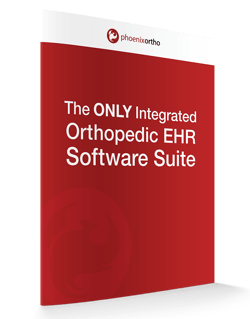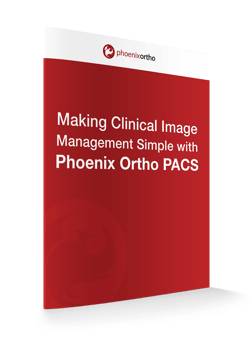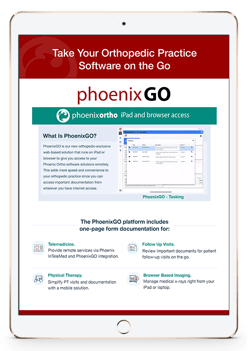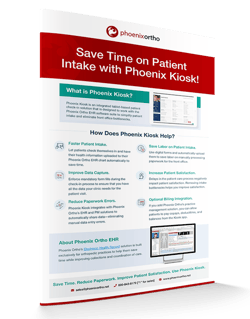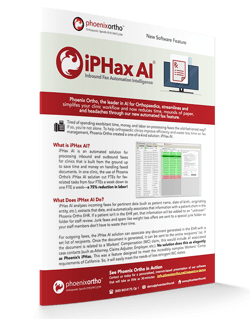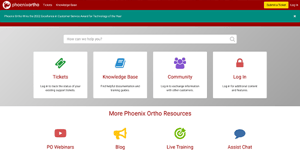Every orthopedic clinic is as much a business as it is a place for orthopedic surgeons and their assistants to provide care for their patients. If the business side of the clinic suffers, then the clinic may be forced to close its doors. This is why orthopedic practice management is so important!
What Is Orthopedic Practice Management?
At its most basic, practice management is the term used to describe all of the processes and tools that relate to the business aspect of a medical practice.
It is a critical part of any orthopedic clinic’s operations—one that influences how efficiently clinic staff can do their jobs, how much time the physicians/surgeons/therapists spend on paperwork vs helping patients, and even whether the clinic is able to turn a profit.
Types of Software Used for Practice Management
There are a few distinct types of software solutions that fall under the umbrella of “practice management software.” This is part of the reason why searching for “practice management software” or “solutions” online can be such a gamble—you may be looking for one specific type of software or solution, but get presented with something completely different.
Also, because of the variability in practice management solutions, you might find a software that is either missing some critical function your practice needs to maintain efficiency or that is so overloaded with unnecessary features that it takes forever for users to learn how to use it—and then take extra time sifting through obnoxiously overstuffed menus during every interaction.
Some of the specific types of software found in PM solutions include:
- Billing Software. Solutions for tracking patient payments and claims submitted to insurers and other payer organizations. Some billing software may even assist with the claim submission process—though not all solutions provide such support. Billing solutions may also help with determining what portion of the invoice for services rendered the patient should be responsible for (such as their copay and deductible).
- Patient Data Capture. Solutions that help with gathering patient information may sometimes fall under the category of “practice management software” with certain PM vendors. This is especially common with data capture solutions that collect demographic information that the practice’s administrators can use to learn more about their customer base to improve patient retention and marketing efforts.
- Insurance and Payer Tracking Solutions. Software that helps the practice keep track of information about insurers and other payer organizations—such as billing codes, insurance policy specifics, and more. This is useful for helping clinics avoid billing code mistakes by staying up-to-date with the latest changes.
- Inventory Management Software. Programs that help orthopedic clinics keep track of their supplies. Some software might specialize in tracking durable medical equipment (DME)—like knee braces, shoulder/arm slings, walking boots, etc. PM systems generally don’t deal with inventory levels, but Phoenix Ortho lets you track inventory in our EHR. Normally, you’d have to go to a specialty DME vendor to get a tracking module added via a third-party interface. With Phoenix Ortho, you can save the time and trouble of managing yet another API that might fail since the DME solution is truly integrated with our software platform.
- Income and Expense Tracking Solutions. Software that helps a clinic’s management team keep track of their accounts payable and receivable. This type of software is often vital for monitoring the viability of the clinic’s finances. If more money is going out than is coming in, that is a clear indication that the practice’s administrators need to make some changes! Some clinics may use generic business software for this purpose.
- Report Management Software. Like any medical practice, orthopedic clinics need to keep detailed records of patient interactions for billing and regulatory compliance purposes alike. So, many PM solutions have some kind of record management software—or are part of a software suite with an Electronic Health Record (EHR) solution that collects and stores patient visit notes.
These are just a few of the specific types of software or software features found in different practice management systems. In some cases, these solutions are available as standalone software programs while others are part of a larger software suite or practice management platform.
Some vendors even label EHR solutions as PM software, since the EHR can be a critical part of the clinic’s business workflow by keeping track of patient visits, helping with setting E & M codes, and capturing visit notes.
Benefits of Orthopedic Practice Management Software
So, how does practice management software help an orthopedic clinic? There are a few ways that the right software can help a clinic, such as:
- Improving Collections. Being able to maximize collections can mean the difference between having a comfortable profit margin and constantly struggling to keep the practice’s doors open. By improving billing codes and claims submissions to maximize revenue and minimize rejections, PM software can help clinics collect more revenue in less time from each patient visit.
- Reducing Burnout Among Clinic Staff. Burnout is a major problem for all roles in any medical practice. Orthopedic surgeons spend a significant amount of time on paper—sometimes more than they spend actually dealing with patients directly. Meanwhile, front office staff often have to deal with tedious manual paperwork that generates a lot of busywork, stress, and paper waste. PM solutions can streamline paperwork immensely to save individual care providers and other staff members a significant amount of time and stress on their workflows. This helps to reduce stress and burnout—which also helps with staff retention in orthopedic clinics.
- Improving Inventory Management. With inventory tracking solutions in a practice management platform, it’s easier for practice administrators to keep inventory of DME and consumables alike at a healthy level without wasting money unnecessarily. This helps to prevent disruptions that upset patients and delay the delivery of billable services.
In short, with the right practice management solution in place, your orthopedic clinic can save time, increase revenue, and drive repeat business from satisfied patients—all while making things more convenient for clinic staff and care providers.
Why Phoenix Ortho Made an Orthopedic-Specific Solution
Most practice management software is meant for primary care or multidisciplinary settings for one reason: it helps the software vendor sell their product to a wider user base than they could if their software was made specifically for the benefit of one kind of medical specialization. They try to be all things to all people because, frankly, it’s more profitable for them.
However, there is a vendor that focuses specifically on the needs of one specialty—Phoenix Ortho. More specifically, we focus on the needs of orthopedic practices to provide them with an optimized practice management solution that addresses all of their needs without wasting their time on extraneous forms they’ll never have to deal with.
We worked with orthopedic doctors, practice administrators, physical and occupational therapists, and orthopedic clinic staff to add the right features to streamline clinical workflows, save time, improve delegation, and increase collections so care providers and staff alike can worry less about moving mountains of paperwork and focus more on getting things done.
Why wait? Discover how you can make your orthopedic practice faster and more efficient now!
Schedule a 1:1
Get in touch with Phoenix Ortho to learn more about how you can save time, money, and mouse clicks with an orthopedic-specific EHR.





